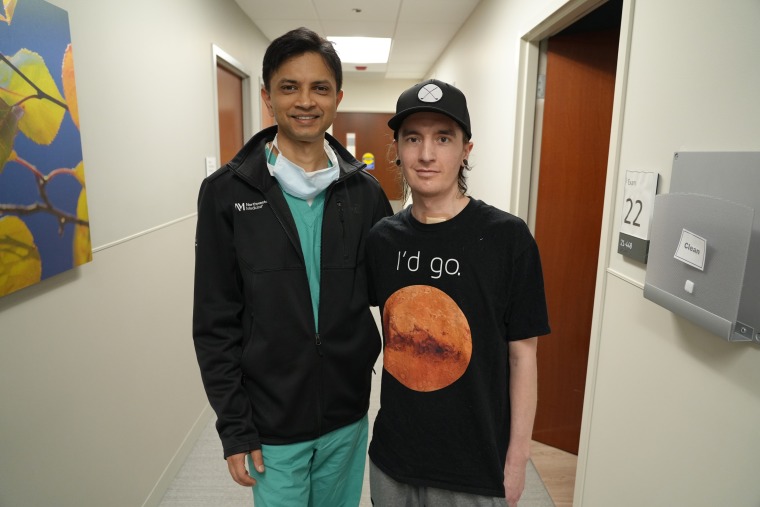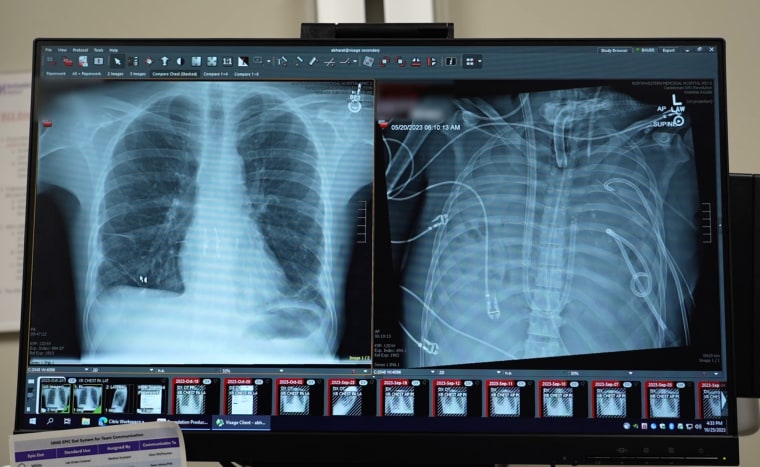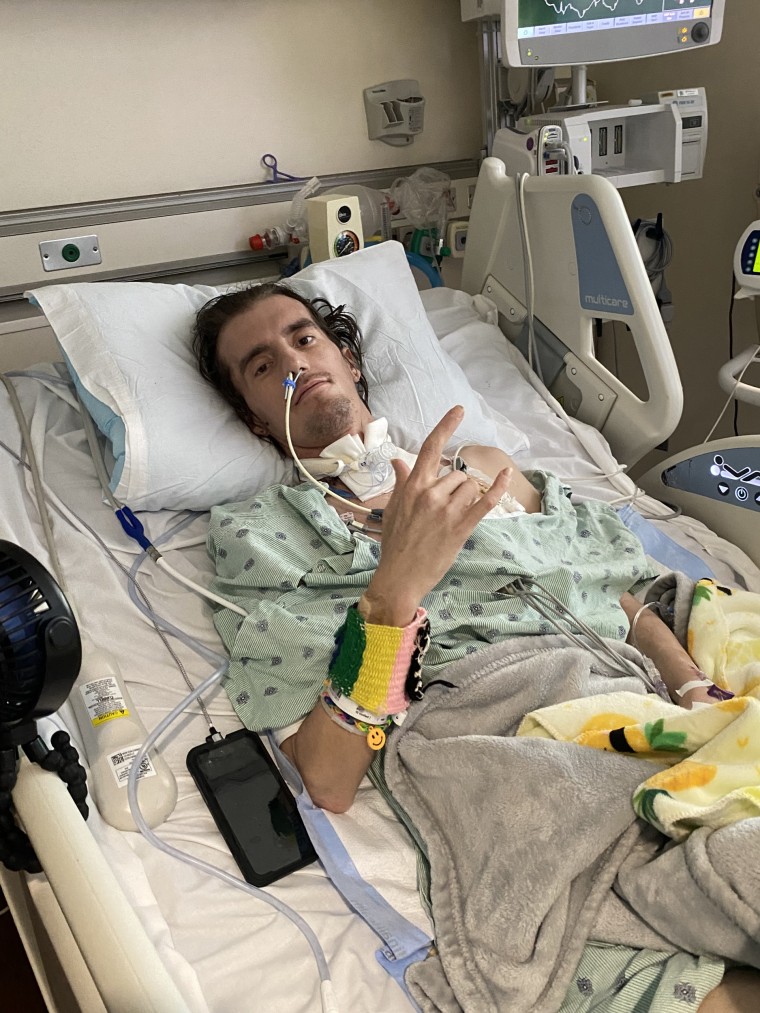Davey Bauer’s lung infection was too life-threatening for a standard transplant. If doctors replaced his lungs with healthy ones right away, Bauer wouldn’t survive the surgery.
In April, shortly after catching the flu, Bauer had developed a lung infection that was resistant to antibiotics. The 34-year-old Missouri resident had a history of smoking cigarettes and also vaped for the last nine years.
Doctors in St. Louis put Bauer on a ventilator in a medically induced coma to support his breathing. But his condition continued to deteriorate.
Bauer was transferred to Northwestern Medicine in Chicago, where surgeons removed his lungs and used a life-support device called extracorporeal membrane oxygenation, or ECMO, to keep him alive while he cleared the infection from his bloodstream.
There was still one problem, though: Without lungs to physically support it, his heart would move around or fall deeper into his chest cavity.

“Once we took the lungs out, we realized that now we’ve got to support the heart,” Bauer’s surgeon, Dr. Ankit Bharat, chief of thoracic surgery at Northwestern Medicine, said Wednesday on a press call. “We were looking for the biggest thing that would fit in there in his chest cavity.”
The solution, they determined, was a pair of DD breast implants.
According to Northwestern Medicine, the procedure is the first time breast implants have been used in a double-lung transplant.
“I didn’t know much of it until after the fact, but I thought that was awesome and kind of funny,” Bauer said of the role the implants played in his procedure.
With the implants keeping his heart in place, Bauer was able to clear the infection. Two days after his lungs were removed, doctors took out the implants and successfully transplanted healthy donor lungs into his body.
Bauer was discharged from the hospital in September and is now being monitored by his transplant team. He is expected to make a full recovery.
“I feel so blessed. It’s incredible,” he said on Wednesday. “I got a second chance at life.”

A rare method of transplant
Often when a critically ill patient is deemed too weak for a lung transplant, doctors may have no recourse.
But the Northwestern surgeons constructed what amounted to an artificial lung that kept supplying oxygen to Bauer’s blood even after his lungs were removed.
The team placed multiple tubes in Bauer’s heart that rerouted his blood out of his body to the ECMO machine. From there, the machine added oxygen to the blood — a job usually done by the lungs — then sent the oxygenated blood back into the body, to the left side of his heart, which pumped it out to the rest of his body.

“We wanted to maintain the natural blood flow in his body that would be present if the lungs were intact,” Bharat said.
Bauer’s partner, Susan Gore, said she can’t comprehend how he lived through the procedure.
“It still blows my mind that he didn’t have lungs in his body but he was still alive,” she said.
Bharat said he hopes the technique can be used to save other patients who are too sick to get transplants right away.
Keeping a patient alive without lungs is incredibly rare and requires a great deal of expertise, but it’s not entirely novel, said Dr. John Michael Reynolds, a transplant pulmonologist at Duke Health who wasn’t involved in Bauer’s case.
“They put these implants in, that’s the eye-grabbing thing,” he said. “But that’s a very minor aspect of what was done.”
In 2019, Reynolds’ team at Duke similarly kept a patient alive without any lungs using artificial oxygen support. The patient, a 30-year-old man with cystic fibrosis, underwent a double-lung transplant six days later and ultimately recovered.
Two years earlier, surgeons at the University of Toronto performed a similar procedure on another patient with cystic fibrosis.
Dr. Brian Keller, medical director of the Massachusetts General Hospital Lung Transplantation Program, said doctors are generally improving their ability to transplant very sick patients, but many transplant centers don’t have the skill for a procedure like Bauer’s.
“There are very few centers in the world that would even attempt to do this,” he said.
No flu shot and a history of vaping
Doctors can’t pinpoint exactly why Bauer developed a life-threatening infection at such a young age. Before the episode, Bauer had never been seriously ill. He enjoyed snowboarding, skateboarding and golf.
“Many things lined up to get him to that point, because otherwise someone who’s healthy and active and young like Davey should not have almost died from a flu infection,” Bharat said.
One complicating factor, Bharat said, is that Bauer had never received a flu shot. While the effectiveness of flu shots can vary from year to year, the vaccines generally reduce the risk of severe illness by 40% to 60% when they’re well matched to circulating flu strains, according to the Centers for Disease Control and Prevention.
Bharat said Bauer’s history of smoking and vaping may also have played a role, though it’s hard to say for sure. Smoking increases the risk of severe respiratory infections and lung disease. Similar, albeit weaker associations, have been identified for e-cigarettes.
“Anytime you inhale something into your lungs, whether it be through vaping, smoking or through occupational exposures, there is a risk for lung damage,” Keller said.
But most cases of vaping-related illness don’t require a lung transplant, he added. A 17-year-old boy in Michigan who received a transplant in 2019 is believed to be the first case.
Regardless of the cause of his illness, Bauer said he’s not keen on vaping anymore.
“I thought it would be a safer alternative” to cigarettes, he said. “In hindsight it just seems like I should have quit sooner.”






